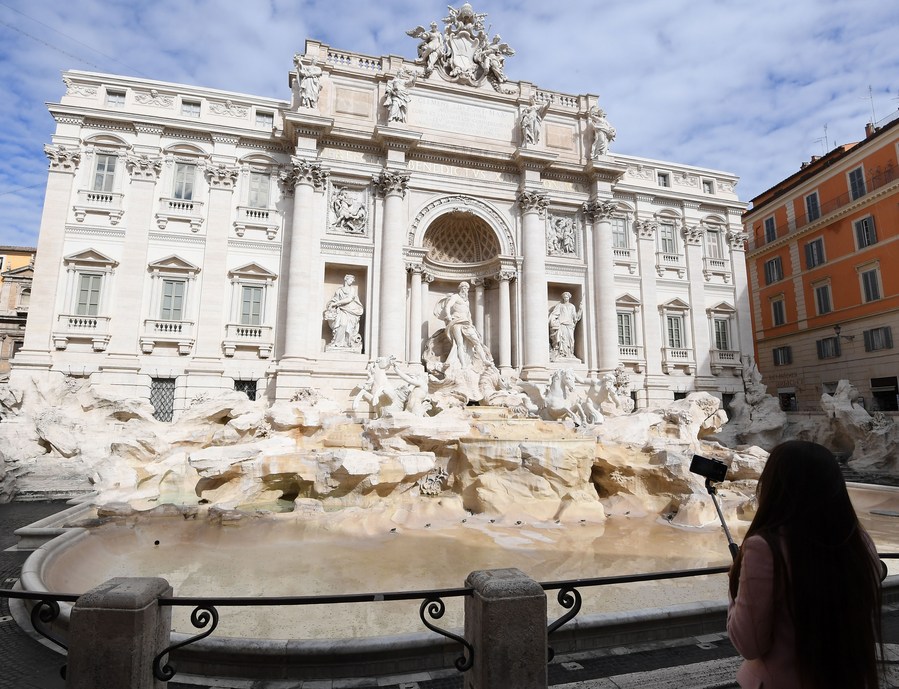
No tourists are seen at the Colosseum in Rome, Italy, March 16, 2020. (Xinhua/Cheng Tingting)
Revenue for hotels in Rome are down 92 percent so far this year compared to the same period in 2019. As many as half of the hotels may never be able to reopen in the wake of the losses from recent months, according to hotel industry group Assohotel.
ROME, Nov. 4 (Xinhua) -- Hit hard by the near-complete tourism blackout in the Italian capital sparked by the coronavirus pandemic, most of Rome's more than 1,800 hotels remain closed, and as many as half may never open again, according to research from one of Italy's main hotel industry groups.
Rome is one of the world's 20 most popular tourist destinations, according to Euromonitor International. But tourist arrivals to the city were blocked starting in March when the government applied Europe's first national coronavirus lockdown. The country opened its borders in stages starting in May, but only a trickle of tourists arrived after that and even that trickle slowed starting in September when coronavirus cases began to surge again.
The result has been devastating for Rome's hotel sector. According to Assohotel, a hotel industry group, revenue for hotels in the capital city are down 92 percent so far this year compared to the same period in 2019. The organization said that as many as half of the hotels in the sector may never be able to reopen in the wake of the losses from recent months.

Tourists visit the Piazza di Spagna in Rome, Italy, March 5, 2020. (Photo by Alberto Lingria/Xinhua)
"Most of the hotels that are open at 10 percent or 15 percent occupancy," Assohotel President Francesco Gatti told Xinhua. "The lifeblood of the hotel industry are the tourists and there are hardly any tourists."
Gatti said there are some steps hotels can take to try to work through the crisis period, including the marketing of "get-away packages" to Italians, or using the hotels as facilities for people in quarantine. But those strategies do not come close to balancing out the overall losses from tourism.
"The hotels that stay open do so as a way to support their brand, to remain part of the public consciousness," Gatti said. "But the amount of business available, even with the few side businesses that are possible, is not nearly enough."
That point was echoed by hotel operators trying to make ends meet in the current market.

A tourist takes pictures at Fontana di Trevi in Rome, Italy, March 5, 2020. (Photo by Alberto Lingria/Xinhua)
China-born Xu Yinping owns four hotels in Rome, totaling nearly 550 rooms between them. She told Xinhua two have been shuttered since the start of the coronavirus crisis and the two that remain open are struggling.
"In the 190-room hotel, we now have 11 guest rooms rented out, and after that, there are 8," said Xu, who moved to Italy in 1996. "I have never seen anything like this, ever, even during the financial crisis in 2008. We can't survive like this. With 8 rooms rented, we don't earn enough to even keep the lights on or to keep the water running."
Angelo Regio, the manager of three small hotels located near the main Termini train station in central Rome, told a similar story.
He tried to reopen two of the hotels when European tourists were allowed to visit Rome starting in June, but one went four days without any guests and he re-closed it. Now, only one of the hotels is open, a 29-room structure.
"Some nights we have one or two rooms rented," Regio said in an interview. "The hotel feels like a ghost town. If things don't improve soon, or if there isn't more help from the government, the city is going to be peppered with abandoned hotels once things return to normal." ■



